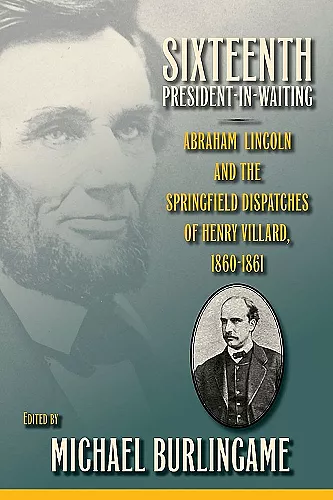Sixteenth President-in-Waiting
Abraham Lincoln and the Springfield Dispatches of Henry Villard, 1860-1861
Format:Hardback
Publisher:Southern Illinois University Press
Published:30th May '18
Currently unavailable, and unfortunately no date known when it will be back

Between Abraham Lincoln’s election in November 1860 and his departure for Washington three months later, journalist Henry Villard sent scores of dispatches from Springfield, Illinois, to various newspapers describing the president-elect’s doings, quoting or paraphrasing his statements, chronicling events in the Illinois capital, and analyzing the city’s mood. With Sixteenth President-in-Waiting Michael Burlingame has collected all of these dispatches in one insightful and informative volume.
Best known as a successful nineteenth-century railroad promoter and financier, German-born Henry Villard (1835–1900) was also among the most conscientious and able journalists of the 1860s. The dispatches gathered in this volume constitute the most intensive journalistic coverage that Lincoln ever received, for Villard filed stories from the Illinois capital almost daily to the New York Herald, slightly less often to the Cincinnati Commercial, and occasionally to the San Francisco Bulletin.
Lincoln welcomed Villard and encouraged him to ask questions, as he was the only full-time correspondent for out-of-town papers. He spoke with inside sources, such as Lincoln’s private secretaries John G. Nicolay and John Hay, devoted friends like Jesse K. Dubois and Stephen T. Logan, political leaders like Governor Richard Yates, and journalists like William M. Springer and Robert R. Hitt.
Villard boasted that he did Lincoln a service by scaring off would-be office seekers who, fearing to see their names published in newspapers, gave up plans to visit the Illinois capital to badger the president-elect. Villard may have done an even greater service by publicizing Lincoln’s views on the secession crisis.
His little-known coverage of the 1858 Lincoln-Douglas Senate race, translated from the German for the first time, is included as an appendix. At the time Villard was an ardent Douglas supporter, and his reports criticized Lincoln.
Not only informative but also highly readable, Villard’s vivid descriptions of Lincoln’s appearance, daily routine, and visitors, combined with fresh information about Springfielders, state political leaders, and the capital, constitute an invaluable resource.
“Michael Burlingame keeps collecting and editing important Lincoln materials. This time, Burlingame has found, compiled, and edited, in chronological order and with informed annotations, the almost daily reports of brilliant young journalist Henry Villard on Lincoln’s three months as president-elect. Villard’s dispatches to the New York Herald and two other newspapers provide revealing information on Lincoln’s daily routine as president-elect—his personality, physical appearance, reception of visitors—and on life in Springfield. The dispatches are filled with humorous anecdotes. Villard’s well-written newspaper reports from Springfield are the best source that we have on Lincoln during the critical months after his election, when he was waiting to become president, and as secession was unfolding in the lower South. General readers as well as historians owe Burlingame a debt of gratitude for this valuable edition of Villard’s dispatches.”—William C. Harris, author of Lincoln and Congress
“Nobody knows better than Michael Burlingame that rarely consulted files of old newspapers contain ‘high-grade ore for the historian’s smelter.’ His magisterial biography of Abraham Lincoln, published a decade ago, made ample use of such material. In this volume, Burlingame ably excavates the writings of journalist Henry Villard, the most astute correspondent posted to Springfield, Illinois, during the fateful months following the 1860 election. Day after day, Villard described Lincoln’s emerging response to the dreadful and unexpected reality of Southern disunion. When secessionists spurned Lincoln’s assurances that he had ‘no right to meddle with slavery’ in the states where it already existed and no wish to impose ‘Negro equality,’ Villard realized that the incoming president might ultimately have to use force to maintain the Union. The taut drama captured in these long-ago dispatches will command the attention of scholars and the wider reading public.” —Daniel W. Crofts, author of Lincoln and the Politics of Slavery: The Other Thirteenth Amendment and the Struggle to Save the Union
ISBN: 9780809336432
Dimensions: 229mm x 152mm x 32mm
Weight: 705g
392 pages